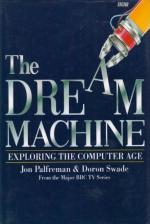
EUG PD
 1st February 1992
1st February 1992
Author: Will Watts
Publisher: BBCSoft/BBC Publications
Machine: BBC B/B+/Master 128
Published in EUG #3
The Dream Machine was written by Jon Palfreman & Doron Swade to accompany the television series of the same name which was screened on BBC2 at the end of last year. Like the series, the book traces the evolution of computing from the dawn of civilisation when pebbles were used to aid simple arithmetic, through the decades of room-size number crunchers, up to the present day - with a few speculations about the future thrown in for good measure.
Quite large chunks of the text are direct are direct transcripts from the actual TV programs, but some passages contain snippets of information which did not go out on air. For example, one of the footnote expansions at the back of the book relates a story concerning an early language translation program which could reputedly translate English into Russian and vice versa. The computer was given the English adage "Out of sight, out of mind", to translate into Russian and back into English. It finally printed out "The invisible are insane"!
Although the book catalogues the step by step advances in technology which over many years have led to present day computers, jargon and esoteric references are kept to a minimum.
The people who made the above mentioned advances are discussed in some detail, some of whom we learn were tragic, misunderstood genii like Charles Babbage who struggled to make people see the potential of his never-completed Analytical Engine and Alan Turing who was far sighted enough to perceive that a computer could be used for a lot more than mathematical calculations, even before one had actually been built!
The history of computers has also been (and still is!) shaped by the attitudes of many hostile doubters, usually those who held the purse strings of research and their almighty gaffs are also revealed.
Once I got past the first couple of chapters, I began to feel as if I were reading some strange detective story where, already knowing the outcome of the case, i.e. present-day computers, discovering the clues was still enjoyable.
Of course the humble Electron isn't mentioned once in all this and Acorn only merit one sentence, but it's interesting to trace the Elk's "family tree" back to the era of valves and punch-cards!
Written in an easy to understand non-technical style, The Dream Machine is a highly readable and in places, quite gripping tome. I only have one reservation about it and that's the price.
At £16.95 this could be quite an expensive addition to your collection, so I would recommend you order a copy from your local library.


